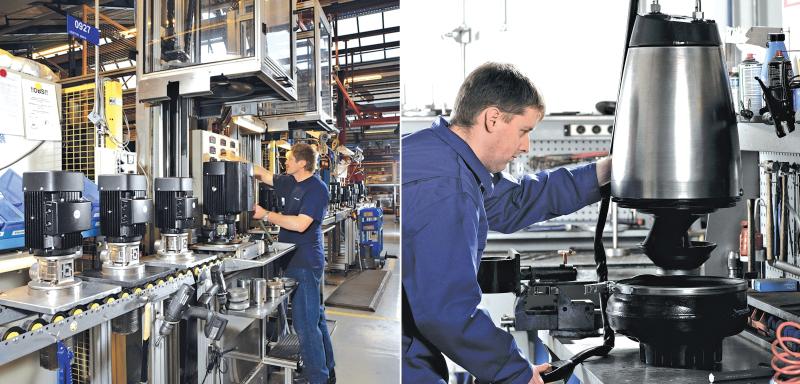
Bjerringbro, DENMARK: Sivam, a native of Vadamarachchi fled to Denmark during the early years of LTTE war. From being a refugee, he has come a long way to secure a rewarding job at one of Denmark’s biggest and most successful companies – Grundfos. Sivam’s children got some of the best facilities in Denmark to continue their higher studies. Today Sivam is a happy man with his children living in Canada and is unlikely to visit his native country in the near future. Life with Grundfos, the pump manufacturer is one of the best for him.
We met Sivam briefly during a recent visit to the company in Denmark. Like Sivam there are over 100 Sri Lankans working in Grundfos, among nearly 50 other nationalities at present.
According to company officials, most of them have landed there under difficult circumstances. The perception in Grundfos is that everyone has something to contribute, no matter where they come from or what they carry with them. The company goes to great lengths to give meaningful work to people facing special challenges, even if it requires special agreements or government support.
The company has been taking refugees and migrants into internships and integrating them into their workforce in production and administration since the 1980s. As the needs have changed, the initiatives they have offered have been adapted to what society is looking for. “For us integration is about training people for the Danish labour market and introducing them to the standards and expectations in a work place,” an official said.
Referring to their present workforce in their factory and headquarters in Bjerringbro, one official said, he speaks more English at work than his national language – Danish- as most people are comfortable with it.
The first refugees, the company has employed came from none other than Sri Lanka, in the 1980s. An official who witnessed the arrival of Lankan refugees said, “It was a trainful of people.” Many of them are still employed including Sivam.
The company started an integration project including language tuition for refugees in 2002. Misgina Tesfay from Eritrea has been doing basic integration training since June 2007. The project is part of a program whereby Grundfos and six other companies support refugees in becoming well-functioning citizens of Danish society, with 100% self-support as a goal.
“I am learning a great deal about Danes and Danish society but the most important thing is that I now know what it is like to be in a Danish workplace. It is very different to what I come from. I really like the fact that Grundfos has expectations and expects something from me,” says Tesfay.
A Syrian refugee Ehab Saad escaped to Denmark from Syria in 2014. After receiving his residence permit in 2015, he was offered a 13-week work experience program organized for refugees by Grundfos and Viborg Municipality. Ehab now plays an important role and active role in developing the company’s future digital business opportunities. “I am very proud to be part of Grundfos’ new digital initiatives towards customers and to have helped create a great new office community in the former electronics factory,” says Eddin, whose current position is Associate Assistant. According to Grundfos officials, the Founder Poul Due Jensen was never satisfied with simply running a company that produced quality pumps and developed innovative technologies alone. He wanted to make a real difference to other people and the world around him. Following the footsteps of the founder, his son, the long-term Group President and Chairman of the Board of Grundfos, Niels Due Jensen believes in ‘social responsibility is an integral part of the company’s identity and core values.’ Accordingly, social responsibility is a central element of the company’s core values and DNA in present context.
Reduced working capacity
Hence in addition to supporting refugees to build a new life, Niels Due Jensen has ensured that the company’s social efforts became global and made it a goal for employees with reduced working capacity to make up three percent of the global workforce. As part of this initiative, employees with reduced working capacity were often employed in flex-department or special areas where the tasks were adapted to the employees’ special needs. Today they work in many other places throughout the company and white collar employees, in particular, who experience health problems can often continue in their former jobs.
The issue of refugees has been a huge topic in the recent past. Grundfos officials say, this is also true in their company. “Since 2002 we have had a special focus on helping refugee people through work experience and Danish language tuition. We have established a language centre in the company in cooperation with local government and work experience positions for production employees and office staff.” Grundfos is not a listed company.
Instead it is owned by Poul Due Jensen Foundation, the employees and the founder’s family, with the Foundation as the primary owner. It was the primary wish of the founder - Poul Due Jensen – not to list it in the stock market.
This stable structure of the Foundation makes it possible to drive its core business along the lines, which have always characterized Grundfos, and which Poul Due Jensen Foundation follows closely through an active ownership system. Besides, Poul Due Jensen Foundation supports projects within these three areas: Water, Research and Inclusion. - CJ
